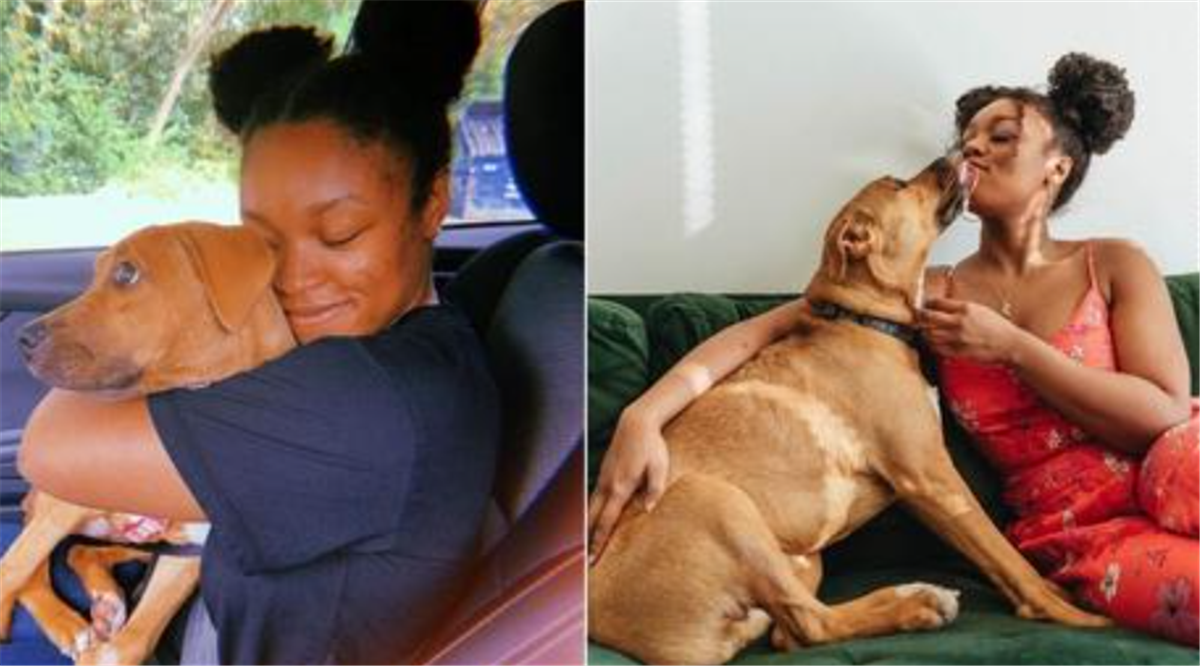This happens way too often 💔
As soon as Kassidi Jones laid her eyes on a shelter puppy named Ginger, she knew they were meant for each other. Jones instantly connected with Ginger’s personality: a little shy, determined and full of love. But she’d soon learn that they had more in common than their inherent sweetness.
“I had no idea that I was opening this big can of worms when I adopted Ginger,” Jones told The Dodo. “I just saw how sweet she was, and I had to bring her home.”
Jones and Ginger became inseparable within their first few months together. The two played together every day, either at home or at their local park. They took regular walks around their neighborhood and snuggled on the couch afterward. But as Ginger grew from a puppy to an adult, Jones noticed a change in how the public treated her.

“As she grew taller and more muscular … we started getting some people crossing the street around us, leaving the park when we showed up or [saying] shady comments about her being a ‘killer,’” Jones said. “People on the street started identifying her as a pit bull pretty quickly.”
Jones never considered Ginger’s breed when it came to adopting her. She’d fallen head-over-heels in love with the pup’s amazing personality, and that’s all that mattered to her. But she was heartbroken to discover that the people in her neighborhood didn’t feel the same way.
“When we’re walking on the street near somebody, they might cross the street,” Jones said. “I understand there are a lot of reasons why someone might not trust a dog. I also think that there could be underlying patterns that have to do with what she looks like and what I look like.”

As a Black woman, Jones recognized people’s reactions to Ginger all too well. She knew exactly how it felt to be treated differently based on her looks. And she realized that, when paired together, the discrimination they experienced was compounded.
“I know what it’s like to be labeled as intimidating or aggressive just because of what I look like,” Jones said. “And, since the 80s and 90s, some people have associated pit bulls with crime and violence … so the two of us together means real trouble to some people.”
Jones felt disheartened every time someone avoided Ginger on their walks or made ignorant comments about her. She could tell it affected Ginger’s mood, too.

“Ginger wears her emotions on her face,” Jones said. “After we have interactions like that, I can see a change in her mood. I feel sad for her when she is excluded from things because of what she looks like and a stereotype of a breed.”
Because of their experiences, Jones decided to start educating the public on racism in the pet world. By creating informative content surrounding antiracist animal advocacy on Instagram, Jones now works toward breaking the stigmas placed on Black pet parents, especially when paired with seemingly aggressive pet breeds.
“There is a pattern, but that means that we can all work together to kind of change the narrative and uplift each other,” Jones said. “I try to give everyone the tools to be an antiracist animal advocate. I come in doing my best, and hopefully, we can make something even better.”
You can watch Jones speak about antiracist animal advocacy here:
Xem bài viết này trên Instagram
It’s not an easy task, but Jones is committed to making a positive impact in the pet world. In addition to creating antiracist animal advocacy content online, Jones has found a new sense of community through groups like Black Women Love Dogs, where she’s met other Black pet parents who understand her struggles on a personal level.
“It was unlike anything I’ve ever experienced,” Jones said. “I’ve never been in a place for dogs with so many people [who] look like me.”
While educating the masses on racism in the pet world is serious business, Jones and Ginger still have fun-filled days together. And whenever they feel misunderstood by their community, the two always feel better knowing they’ve got each other to lean on.
“She’s a lovebug, I’m a lovebug, and I think we’re a match made in heaven,” Jones said. “I couldn’t imagine life without her.”
